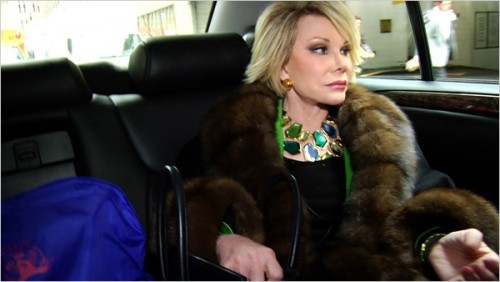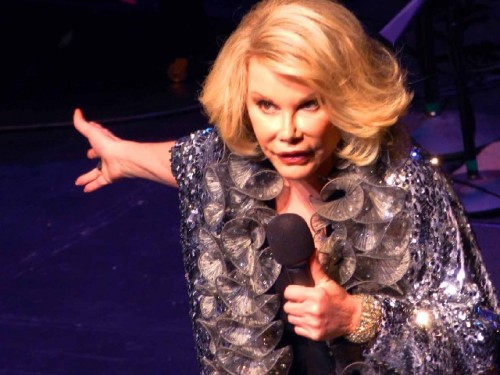Joan Rivers: A Piece of Work
Poignant Documentary Conflates Pain and Comedy
By: Charles Giuliano - May 14, 2013
Joan Rivers: A Piece of Work
Directed by Ricki Stern and Annie Sundberg; written by Stern; director of photography, Charles Miller; edited by Penelope Falk; music by Paul Brill; produced by Stern, Seth Keal and Sundberg; released 2010 by IFC Films. Running time: 1 hour 24 minutes.
The documentary Joan Rivers: A Piece of Work was featured by the Berkshire International Film Festival at the Mahaiwe in Great Barrington with a personal appearance by the acid tongued diva.
As is often the case in the Berkshires it is a matter of scheduling and being in two places at once. So we missed the event seeing Rivers live for the first time at the Colonial Theatre in Pittsfield this past weekend.
Pittsfield?
Why Pittsfield for cripes sake for a star of her wattage?
It was a question she herself posed while knocking an audience out of their seats with a screed of scathing insults as reported here.
Yesterday, I viewed the documentary on Netflix and now have some answers to that and other questions.
The film, directed by Ricki Stern and Annie Sundberg, who trailed her for 14 months, reveals a vulnerable and compellingly compassionate little lost girl from Brooklyn behind that grotesque, surgically altered mask.
Trust me Joan darling, I really really feel for you. Air kiss, air kiss.
It is truly liberating to know that, as one might suspect, there is another side to the comedic pit bull who spins our deepest pain and suffering, including her own, into some of the most brilliant and vicious satire of our time.
Why Pittsfield?
It seems that in order to stay precariously on top of an exotic, expensive, quixotic lifestyle she accepts any and every offer and opportunity.
Showing us a stack of past appointment books they become a vivid chronicle of the precarious ups and downs of show biz. An empty page, her deepest fear and anathema, reflects phone calls not returned, appointments cancelled, a shrinking fan base, and a media that has moved on to other hot buttons.
The King of Late Night Television, Johnny Carson, fueled both her meteoric rise, to a position as permanent guest host, then a crashing fall.
As she tells us, over, and over, and over, when she was offered her own late night show on another network the first call she made was to Carson. He slammed the phone down. Called her back. Then slammed it down again.
After that she never again heard from him while behind the scenes he attempted to ban her from his network and ruin her career. When her show was later cancelled he came close to succeding.
As she tells it many doors that slammed shut, for decades after, never again opened. Rivers sees herself as an outsider shunned by all but a few of her peers and entertainment executives.
It is well know that off camera Carson could be a putz like Bing Crosby. No wonder there were all those wives and divorces he joked about.
She returned to win NBC's Celebrity Apprentice which was like a shot of botox to her then sagging career. "I'll get those bastards" she tells us.
Everyone knows our culture is obsessed by youth, beauty, talent, and too brief celebrity.
Which leaves out most of us.
For those basking in klieg lights out of sight is out of mind.
Grotesquely, as a poster child for cosmetic surgeries, Rivers illustrates that remaining beautiful is part of the show biz game.
Imagine Taylor Swift prancing about at 50.
Whatever happened to Boy George?
When you get another shot at the brass ring, like Celebrity Apprentice, or another dash down the red carpet, you have to look absolutely fabulous. Air kiss. Air kiss. Air kiss.
The tabloids recently chronicled the hundreds of thousands of dollars in cosmetic procedures of the ultimate celebrity couple Brad Pitt and Angelina Jolie.
Today, catastrophically, it was reported in the media that Jolie recently went under the knife for a different reason. A double mastectomy.
In the game of life nobody gets out alive.
During a scene of Rivers in performance she is heckled by an audience member who proclaims that, because he has a deaf child, he doesn’t appreciate her humor.
In perhaps the most riveting moment in the absorbing film she fights back with ferocious anger. “It’s comedy” she proclaims. In the context of don’t talk to me about the handicapped she describes dragging around a husband who “Lost a leg in the war and then didn’t go back to look for it which is littering.”
With her daughter Melissa, a partner in TV projects, they made a faction show about recovering from the suicide of their husband and father. That was combined with individual and couples therapy. It may have been a so so drama but seminal in the healing process for mother and daughter.
The scenes between them are fascinating. It conflates Joan’s guilt for abandoning her daughter during formative years and a busy career. And Melissa’s seething resentment with the love/ hate of a career riding the coat tails of her Mom.
We see them bickering in the back seat of a limo. Melissa smokes but has cut back to three cigarettes a day. Joan is relentless the Melissa must quit citing grim statistics.. Imploringly, like any daughter, Melissa is looking for some recognition of the struggle to cut back on a dependency.
There are vignettes revealing the lifestyle of the rich and famous.
Offering us a glimpse of the gilded, Louis XV interior of her NY condo she states “This is how Marie Antoinette would live if she had money.”
We see her toasting guests during a catered Thanksgiving dinner for family, friends and neighbors. There are several waiters in tuxedoes.
It takes a village to stay on top.
There is a small but loyal staff that keeps her going from housekeepers, to a personal assistant, manager and lawyer. On speaker phone we hear her making deals.
Rivers leaps at a rare opportunity to appear with the reigning royalty of comedy in a tribute to George Carlin. For her segment there are a few minutes to prepare. This she contrasts with peers currently on top of the game who have arrived with entourages.
Yet again she vents on rejection and always being the afterthought or uninvited outsider. She pays a price for scorching her friends. Now in her 80s, well in a couple of weeks, there are more and more funerals. Fewer and fewer she can rely on. Like the manager she was forced to fire who had been with her through the worst of times. She dwells on the loss of Edgar, a man she never loved, and lousy busineessman, with whom she had a good marriage.
We learn that her first and abiding love is theatre. During the filming she was preparing a play for the Edinburgh Fringe Festival followed by a London run. The ambition is to take the show to New York or LA. There perhaps, yet again, to be trashed by reviewers.
Comedy for Rivers has always been a means to an end. To pay the bills between roles in theatre.
Choking back tears while relating that she show she worked so hard on is closing in London with no future. She utters plaintively that "Nobody respects me as an actress." Rivers can take it when critics trash her as a comedienne and devastating when they attack her acting.
As she told the heckler, we are defeated if we can’t make comedy out of tragedy. It’s gallows humor during the darkest hour that sustains us.
There was an incident soon after 9/11. During a comedy roast by Gilbert Gottfried at the Friars Club his 9/11 gags had audience members yelling "too soon". Gottfried improvised and performed "The Aristocrats” to great applause.
In London in 2002 Rivers cracked that widows of fire fighters killed in the attacks would be disappointed if their husbands had been found alive. They would be forced to return money they had received as death benefits. The callous, cruel joke received condemnation from Harold Schaitberger, General President of the International Association of Fire Fighters.
As this film reveals through all the triumphs and tragedies of life it is better to laugh than cry.
For that we love you Joan.
You fucking freak.



